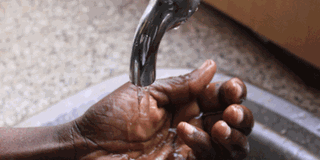Washing one’s hands right

When hands are not washed with soap, there is a high likelihood of infections. Photo by Ismail Kezaala.
What you need to know:
Proper hand hygiene practices minimises disease and its spread. Clean hands can stop germs from spreading from one person to another and throughout an entire community.
You obviously know that washing your hands is important because it kills germs. But did you wash your hands before giving your child medication? How about just after driving? Did you wash up after playing with your lovely pet? And after touching the banister while ascending the stairs? As you touch different objects, germs accumulate in your hands and when you touch your nose, eyes or even mouth, you unknowingly infect yourself with those germs.
Quite a number of the people in various communities countrywide don’t effectively wash their hands, a situation that has led to persistent prevalence of hygiene related diseases, health officials have said.
Health workers say that only about 28 per cent of school children wash their hands after visiting the toilet.
“Many people don’t value hand washing as being critical in maintaining good health, and when they wash, many simply wet their hands and never use soap,” says Ms Julian Kyomuhangi, the assistant commissioner in charge of Environment Health at the Ministry of Health.
So why it is important for one to wash their hands? Dr Henry Bukenya a physician at Mulago Hospital, says, “Our hands are the most germ prone areas because they are exposed. But most people neglect them and pay attention to other germ prone areas like private parts and armpits. They forget that it is the hands that clean them.”
The doctor says atherogenic micro-organisms which consist of micro bacteria and micro protozoa are the common germs that people get on their hands and they are contagious. Worm infestation is another common way that people can get germs.
Also, according to Kyomuhangi, if they do not wash their hands, containers or utensils, chances are that 30 per cent of people will get respiratory diseases. “Proper hand washing can reduce diarrhoea by 40 per cent in the communities, she says.
Speaking at the launch of the National Hand Washing Campaign targeting mainly school communities, Ms Kyomuhangi suggested that school administrators need to create rules to promote hand washing with soap for proper hygiene and sanitation.
Soap campaign
It is for that reason that Unilever Uganda, a sundry manufacturing company in partnership with government, has chosen to implement the campaign that seeks to promote an enabling environment for behaviour change to enhance hand washing.
According to Mr George Inhoro, the managing director of Unilever Uganda, the initiative seeks to reduce government expenses on preventable diseases like cholera, diarrhoea and hepatitis.
“Teachers are custodians of the children for they are with them for longer hours than the parents and given that children learn more at their age, we expect to develop ambassadors of hygiene from school,” he says
Eng Eron Kabirizi, the chairman of the National Hand Washing Campaign explained that washing is not enough. One needs to use soap.
“Improved hand washing with soap is the best way of reducing cases of child mortality. Washing hands without soap is just useless,” he said.
Even then, Dr Bukenya says that washing hands with soap may not eliminate all the germs especially because people don’t wash their hands thoroughly. “But if washed with antiseptic soap that is medicated (toilet soap) about 80 per cent of the germs are eliminated... Washing with washing soap, which has a lower concentration of antiseptic, washes off 40 per cent of germs.”
This is how, according to the doctor, you should wash your hands:
Smear soap on them, scrub your hands using a soft brush or towel and make sure every corner and crevice of the hand is washed.




